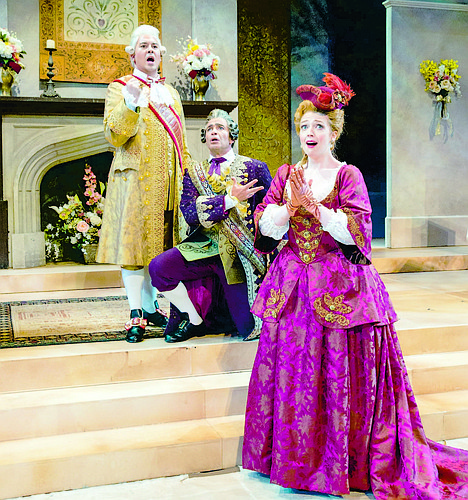- April 18, 2024
-
-
Loading

Loading

What a difference a year makes. In 1840, Giuseppe Verdi’s wife and, two children died and then, “Un giorno di regno” (“A King for a Day’) came along and everyone hated it. Not the best of times. Everything, from the singers on stage to the gods in the heavens, seemed to be conspiring against Verdi.
Now, I wasn’t there, but my guess, based on the joyful music and the splendid current production at Sarasota Opera, is that Verdi didn’t have the right cast 173 years ago. His singers were expecting “Un giorno” to be a serious story, and they were probably serious singers without a funny bone in their bodies. They were probably miffed they weren’t singing “contemporary” Verdi, but, rather a Verdi who was looking back at the music theater of Rossini and Donizetti. So, they didn’t give the work the performance it deserved, and “A King for a Day” became a flop for the times.
That’s not so with the new production at Sarasota Opera. In the elastically humorous hands of director Martha Collins, this cast has made “A King for a Day” a hit for the season.
The story, based on the comedy, “Le Faux Stanislas,” (The False Stanislaw) by Alexander Duval, has all the wit, eccentricity and hilarity of a really good farce. The King of Poland, Stanislaw, has asked the Cavaliere of Belfiore to take his place for what turns out to be a day while he tends to business in Poland. The false king visits the castle of the Baron of Kelbar whose friends are kowtowing and bowing to the “king,” trying to win his favor. There are a couple of love trapezoids (far more entangling than the simple triangles), a nest of two-faced, slightly dim-witted counts and squires out to get what they can, even if it means selling off daughters and lovers like a pound of lox at Zabars. And there’s the false king who knows he may never have the power that’s suddenly been thrust upon him and, with his penchant for meddling in the love lives of others, manages to contort, manipulate and alter the future of every individual in the court, mostly for the better.
Corey Crider, as the king for a day, is a warm, believable poseur who searches beneath the outer crustiness of power and comes up with a fun-loving, attractive character. Crider, a baritone who seems able to do almost anything with his voice, beautifully embodies the Cavaliere and is able to play with the audience, as well as his colleagues on stage.
That playfulness seems to embody everyone on stage thanks to Collins’ understated but immensely funny staging. This slightly incestuous court (everyone seems related to everyone else), in Collins’ hands, isn’t a group of singers but, rather, a set of evolving individuals who entertain and delight each other, as well as the audience.
Jennifer Feinstein, as the Marchesa of Poggio, who is really the Cavaliere’s lover but isn’t quite sure if she’s seeing her real fiancé or just his face on the body of the King of Poland, is believably befuddled by all the flummoxing. A mezzo of enormous range and flexibility, her Marchesa is an attractive, smart woman who turns perplexing circumstances to her own advantage.
Danielle Walker, our Giulietta, who is almost married off to the wrong man, is a charming, beautiful young soprano with a lyric voice that carries well over the footlights and has a demeanor reminiscent of Beverly Sills in her energetic hey-day.
Stefano de Peppo, her father, the Baron, and Kevin Short, Signor La Rocca, are hilarious as the social-climbing duo who threaten, cajole and coax each other into what could be ruination, were it not for the false king’s commitment to set the world straight in 24 hours. Short, particularly, has a wonderful proclivity for comedy and, by not over-acting or over-singing, almost stole the show.
Finally, Hak Soo Kim’s light but far-reaching tenor turned Edoardo, the young officer in love with Giulietta, into a prince-of-a-person and singer.
Jeffrey W. Dean did miraculous things with scenery that seemed plucked out of a late Ingres or early Monet painting. Each set, from the halls of the castle to the gardens outside, were works of art, which Ken Yunker brilliantly set.
The orchestra, under Victor DeRenzi, was extraordinary. It sounded stylish and offered just the right kind of support for the excellent soloists and chorus on stage. But, why didn’t that excellent chorus get a curtain call? They do so well, sound so good and add so much character but never get the deserved praise.